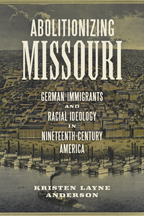
272 pages / 6.00 x 9.00 inches / 21 halftones, 2 maps, 1 chart
History / United States - Southern History | Social Studies / Slavery Studies
Historians have long known that German immigrants provided much of the support for emancipation in southern Border States. Kristen Layne Anderson’s Abolitionizing Missouri, however, is the first analysis of the reasons behind that opposition as well as the first exploration of the impact that the Civil War and emancipation had on German immigrants’ ideas about race. Anderson focuses on the relationships between German immigrants and African Americans in St. Louis, Missouri, looking specifically at the ways in which German attitudes toward African Americans and the institution of slavery changed over time. Anderson suggests that although some German Americans deserved their reputation for racial egalitarianism, many others opposed slavery only when it served their own interests to do so. When slavery did not seem to affect their lives, they ignored it; once it began to threaten the stability of the country or their ability to secure land, they opposed it. After slavery ended, most German immigrants accepted the American racial hierarchy enough to enjoy its benefits and had little interest in helping tear it down, particularly when doing so angered their native-born white neighbors.
Anderson’s work counters prevailing interpretations in immigration and ethnic history, where, until recently, scholars largely accepted that German immigrants were solidly antislavery. Instead, she uncovers a spectrum of Germans’ “antislavery” positions and explores the array of individual motives driving such diverse responses. In the end, Anderson demonstrates that Missouri Germans were more willing to undermine the racial hierarchy by questioning slavery than were most white Missourians, although after emancipation, many of them showed little interest in continuing to demolish the hierarchy that benefited them by fighting for black rights.
1. Slavery Must Persist Among Us for Many Years Yet
Slavery and German Immigrants, 1848–1854
2. Abolitionizing Kansas and Missouri
German Attitudes Toward Slavery, 1854–1860
3. At the Point of Dutchmen’s Bayonet
The Early Years of the Civil War
4. Für Einheit und Freiheit
The Politics of Emancipation
5. The Perfect Equalization of Blacks and Whites
The Transition to Freedom
6. Equal Justice to All, Without Regard to Color
The Debate over Black Suffrage
Kristen Layne Anderson is assistant professor of history at Webster University in St. Louis, Missouri.
“Sound, logical, and convincing. Anderson’s study reveals quite a bit about the evolution of abolitionism among Unionists and about the ways that nativism and race worked together to forge identities among white ethnic Americans.”—Missouri Historical Review
“A concise, carefully argued monograph that fills an obvious void in previous scholarship related to this period in Missouri’s history. . . . [Anderson] has produced what will likely become a go-to reference work on the political history of German Missourians from the late antebellum period through the tumultuous years of the Civil War and Reconstruction. That is no small accomplishment, and I recommend that all students of Missouri history – whether professional historians or lay persons – add it to their libraries.”—Civil War Book Review
“[An] extremely well-informed book. . . . What this book does more than any other currently available is to emphasize the continuing presence of non-radical Germans, who felt that they could live and prosper alongside slavery.”—Civil War History
Found an Error? Tell us about it.